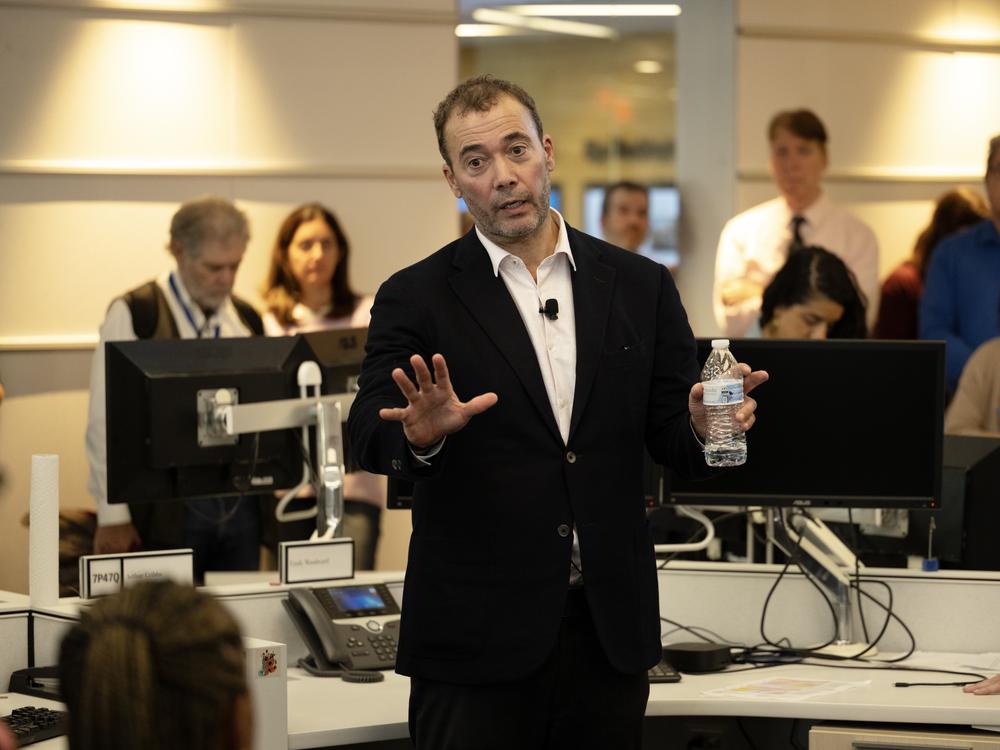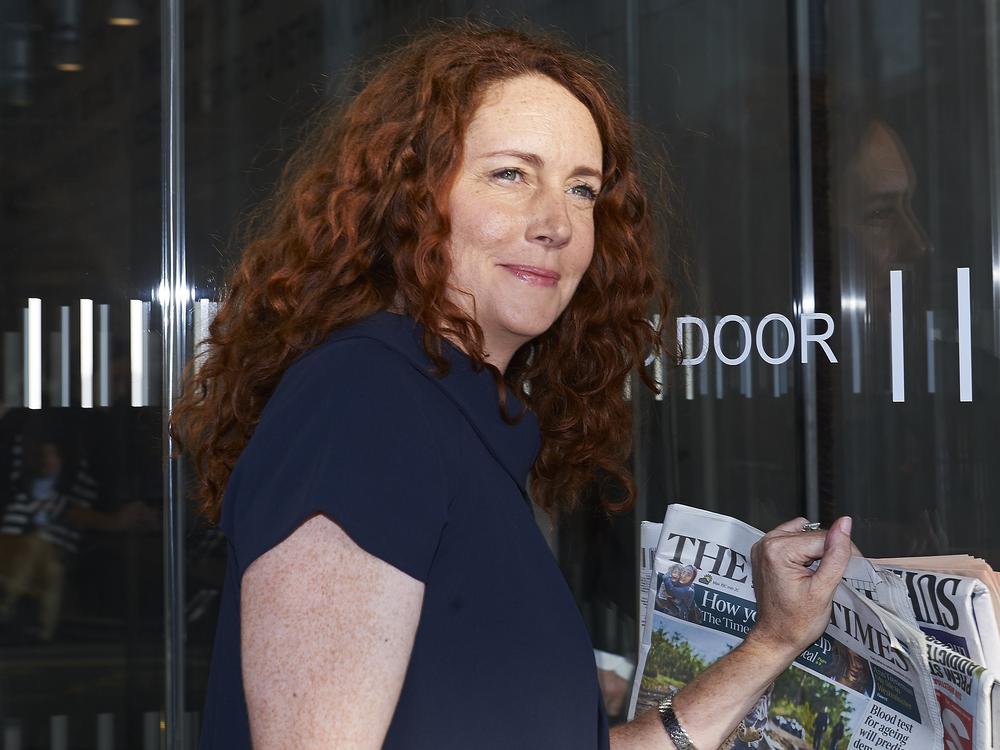Section Branding
Header Content
Washington Post CEO accused in court of deceiving police about U.K. hacking scandal
Primary Content
LONDON — Attorneys for Prince Harry and prominent U.K. politicians Monday accused Washington Post chief executive and publisher Will Lewis of concocting a story 13 years ago to shield evidence from police of possible crimes at Rupert Murdoch’s British tabloids.
In court, the lawyers submitted a statement arguing that Lewis “fabricated a fake security threat” in January 2011 to justify the deletion of millions of emails dating from the start of 2008 through the end of 2010 — an act that those suing the company suggest is part of a wider coverup.
The Murdoch newspaper company, now called News UK, denies those claims. Lewis has broadly denied any wrongdoing but declined to comment to NPR Monday.
The Murdochs have paid more than $1.5 billion to settle scores of lawsuits since a simmering scandal over phone hacking erupted into a full-fledged crisis in the summer of 2011.
The people targeted by the tabloids include crime victims, sports figures, celebrities, royals and politicians — some of whom are now alleging the Murdoch enterprise invaded their privacy not only in pursuit of headlines, but as part of corporate espionage. News UK denies this, noting it is an allegation made in pursuit of their lawsuits against the company. Lewis is not a defendant in the cases.
Accusing two politicians of trying to steal corporate emails
In July 2011, when police first learned of the deleted emails, Lewis explained that Murdoch’s company was compelled to get rid of them because of a tip that he and a senior executive received nearly six months earlier: an “outside source” told them that former British Prime Minister Gordon Brown was conspiring with a News UK employee and another person to steal the emails of the CEO. That unnamed person was said to be Tom Watson, then a leading member of parliament and critic of the Murdochs. The IT person was later alleged to have been a former News UK staffer.
Brown has denounced the claim as false and outrageous. He’s asked Scotland Yard for a criminal investigation of the episode involving Lewis. Watson, who is among scores of litigants suing News UK alleging illegal invasions of privacy, has denied it. In court, the lead trial attorney for Watson, Harry and the others called the story “a ruse.”
In a statement to NPR, News UK said it had responded to a real concern: Someone was trying to steal the emails of its CEO, Rebekah Brooks. The company said it did not justify the email deletions on the basis of the suspected security breach. It said it did not disclose the alleged breach to police earlier because it commissioned an outside consultant to do “forensic checks” and found no evidence of tampering.
“[News UK] had received information that there was a direct threat that a current or former employee was actively trying to sell data belonging to [the company,]” a corporate spokesperson said in a statement. “The information indicated that the threat was to Mrs. Brooks' data and involved a level of technical detail which made it more serious and credible. Those factors contributed to the decision to ensure that multiple copies of confidential [News UK] data should not be held in the various systems operated by the company at the time. To do so in systems with weak controls, including [News UK's] old and unstable email archive system, would have increased the risk of loss of data and would have been poor practice.”
To date, News UK has produced no evidence to substantiate the concern or to shed light on the source. Lewis later went on to become publisher and chief executive of Murdoch’s Wall Street Journal in the U.S. for six years.
Intense scrutiny of Lewis’s journalistic past has cast a pall over his brief tenure leading the Post, as have revelations that he pressured NPR and his own former top newsroom editor not to cover developments in the ongoing hacking cases. Lewis has put a half-dozen former colleagues in prominent positions at the Post. His appointee to become executive editor at the Post, deputy Telegraph editor Robert Winnett, withdrew before making it to Washington.
Tasked with aiding police investigations
Lewis joined News UK in September 2010. Early the next year, he became one of a few company executives charged with handling the escalating scandal over its tabloids’ breaking into mobile voicemails and otherwise illegally acquiring the confidential records of the subjects of their reporting.
As the investigative journalist Nick Davies has written, Murdoch met with Brooks in London during the day of Jan. 24. That evening, News UK’s chief tech officer, Paul Cheesbrough, sent the email to Brooks saying that he and Lewis had just been told of the ostensible scheme involving Brown that very day. Lewis was copied on the email, which was presented in court Monday.
“He provided us with no further detail,” Cheesbrough said of the person who gave him the warning, “other than that his informant was a trusted Police source and implied that the source had been in recent conversation” with Watson.
If invented, the allegation involving Brown and Watson represented an audacious act of jujitsu. Both men say they were victims of the Murdoch tabloids’ phone hacking, though Brown has not sued and that claim has not been tested.
In early February 2011, Lewis sent Cheesbrough an email saying that a “green light” had been given by a company attorney for “email migration.” Mass deletions soon followed, though News UK was under investigation by police and had been told to preserve all such material. Brooks’ computer files were also kept from Scotland Yard.
Cheesbrough is now a top executive in New York City for Murdoch’s Fox Corp. A spokesperson for Fox Corp. deferred comment to News UK.
Accused of corporate espionage to protect a deal
Both Watson and former Business Minister Vince Cable are accusing News UK of illegally invading their privacy to further its corporate interests. News UK denies this.
Watson was a leading critic of the Murdoch press. Cable, known to be skeptical of Murdoch, had to decide whether the Murdochs could take full control of the broadcasting giant Sky. They allege that News UK hacked government officials to learn of their political strategies, to intimidate Watson from criticizing them during ongoing parliamentary investigations, and to seek intelligence on what Cable was doing about Sky.
Their trial attorney, David Sherborne, also accused Lewis of violating Cable’s privacy by leaking audiotaped private remarks recorded surreptitiously by journalists for the rival Telegraph, which Lewis used to lead as editor.
The audio was posted publicly not by the Telegraph but by Robert Peston, a leading journalist for the BBC at the time, who was a close friend of Lewis.
Lewis has repeatedly declined to comment on whether he was a source of the audio, including in front of a judicial inquiry.
Release of the audio — in which Cable said he had “declared war” on Murdoch — caused a swift backlash. He was removed from reviewing the Sky deal, valued at $15 billion. The job was handed off to a Cabinet minister seen as a friend of Rupert Murdoch’s son James, who oversaw his British holdings at the time. News UK denies that Lewis leaked the video to push Cable out of his regulatory role.
When public outrage erupted over the hacking scandal in July 2011, the Murdochs shut down their Sunday tabloid News of the World and withdrew its bid to take over all of Sky. Years later, after another effort failed, they sold their 40 percent stake to Comcast.


